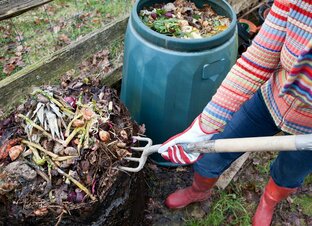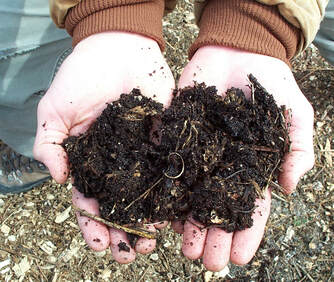
There are two kinds of processes that produce compost: anaerobic decomposition (without oxygen) and aerobic (with oxygen). When anaerobic decomposition takes place in nature, it usually takes place in places with low oxygen levels, like the muds at the bottom of marshes. Aerobic decomposition, on the other hand, takes place where there is sufficient oxygen, like ground surfaces like the forest floor. A couple differences between anaerobic and aerobic decomposition are that anaerobic decomposition often gives off unpleasant odors and doesn’t give off much heat; whereas aerobic decomposition gives off no odors and releases a great deal of heat.
Several requirements for efficient composting include aeration, moisture, particle size, and temperature. Aeration is important to allow aerobic decomposition to take place, since aerobic decomposition is quicker than anaerobic, and doesn’t allow foul odors to develop like with anaerobic. Moisture is also important, because a dry compost pile won’t biodegrade very well. There should be enough water that the compost is damp but not soggy, because too much water can create anaerobic conditions. Also, grinding the organic material into smaller particles can reduce the time it takes to biodegrade the compost. The smaller the size of the particles of the compost, the more quickly the microbes can break down the compost. Finally, temperature is important to ensuring proper decomposition of compost. Lower temperatures slow down decomposition, while higher temperatures speed it up.
Many different types of organisms help to break down compost. The most important ones are bacteria. The bacteria present in a compost pile depend on the raw material present, the amount of moisture in the pile, the amount of oxygen in the pile, the temperature in the pile, and various other factors. Compost normally contains a large number and wide variety of bacteria, fungi, molds, and other organisms.

We encourage you to do your own composting, perhaps starting by having a worm bin to use at your house. If you have the room for it on your property, you can also start an outdoor compost pile. Composting helps the earth, and we hope you do your part to repurpose food waste and create healthy, sustainable soil!
 RSS Feed
RSS Feed
